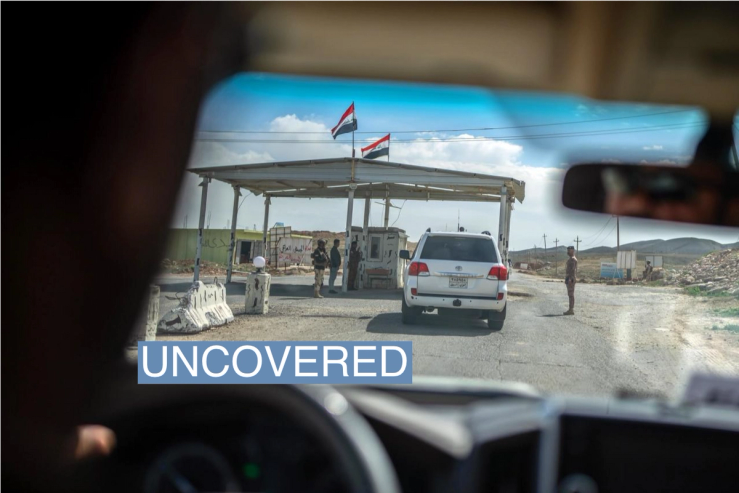The Scoop
The New York Times fired its second Baghdad bureau chief in five years in a bizarre saga that has infuriated some of the paper’s staff in the Middle East.
Three people with knowledge of the situation told Semafor that Jane Arraf was put on leave earlier this year amid an investigation by the paper into whether she misused the bureau’s funds. Two people with knowledge of the situation said that among the issues the Times examined was Arraf’s decision to pay non-US journalists over the paper’s $150 a day limit, a cap that has prompted grumbling in at the Times’ foreign bureaus in recent years, including at its office in Baghdad. Arraf has privately disputed that her spending within the bureau was improper.
Arraf is a veteran of the CNN Iraq bureau, who began work there in 1998 and was for a time the only Western correspondent in the country. She joined the Times in 2020, but clashed with management when the paper ordered her to cut costs by firing some non-US staff working in the bureau.
Arraf pushed back against the moves, and according to two people with knowledge, even suggested to some bureau staff that they look into whether the Times’ decision may have violated local Iraqi laws.
One person familiar told Semafor that the Times and Arraf are continuing to negotiate over the circumstances of her departure. After Arraf was put on leave, several staff who have worked for the Times abroad complained about the decision to the paper’s management.
A spokesperson for the Times declined to comment.
In this article:
Max’s view
Arraf occupied what was once one of the most coveted foreign postings in journalism. But her unceremonious departure came as Iraq was marking the 20th anniversary of the US invasion of the country, and with it, the continued shift of American media attention and resources away from Iraq for conflict zones like Ukraine and the deep-pocketed Emirates and Saudi Arabia.
Over the last several years, almost every major US outlet has scaled back its presence or pulled out of the country: The Times, which once had over a hundred people in its Baghdad office, has not had a bureau chief there for most of the year. The Associated Press’ Iraq correspondent was reassigned to Ukraine last year. While the Washington Post has a Baghdad bureau chief, the paper is in the process of closing down its physical bureau.
The moves are understandable. Major US news organizations have limited resources for on-the-ground foreign coverage, which is costly and often has a limited audience at home. With the US spending billions on the war in Ukraine, and with an increasing diplomatic focus on China, it makes sense that major US organizations have reoriented their international coverage to focus on these areas of national interest.
But the pullback has left Iraqi and other Arab journalists who cover Iraq feeling frustrated, serving as a reminder that American interest in the country extended only to conflict.
“Western newspapers have abandoned Iraq,” one Arab journalist who has written for the Times told Semafor.
Arraf’s departure is also just the latest data point in the tumultuous recent history of the Times Baghdad outpost.
Her predecessor, Margaret Coker, left the Times after the paper concluded that she worked with the Iraqi government to bar fellow Times journalist Rukmini Callimachi from entering the country. Coker believed that Callimachi’s reporting was reckless and didn’t meet the paper’s standards.
And while her conduct may not have been collegial, the substance of her suspicion was borne out several years later when Callimachi’s hit podcast Caliphate was forced to correct major errors that relied on faulty information from one of its key sources.
Room for Disagreement
Step back from the internal disagreements among the American press, and you find a more scathing critique from the Middle East.
“As far as much of the mainstream media is concerned, Iraq is a forgotten country, the war a past occurrence. Even among peace activists and antiwar colleagues, we have found a reluctance to talk about the Iraq conflict, and in some cases point-blank refusal to engage in commemoration work,” reads an op-ed published by the Qatari network Al Jazeera earlier this year. “This thunderous silence points to a difficult truth: two decades after the invasion, American propaganda has conclusively won the Iraqi battlespace.”
Notable
- The pullback from Iraq is a part of the shifting priorities at the Times, which just a few years ago was pouring resources into the controversial “terror beat,” which was heavily focused on Syria and Iraq. But its reporting there sometimes over-hyped the capacity of the terror group ISIS.
- The disillusion in the Times’ Middle East bureaus runs deep. Correspondents’ experiences since 2015 have been “like losing faith in a church,” C.J. Chivers told editors, according to the Washington Post’s Erik Wemple.
- Back in 2004, the Times examined its own coverage of the run-up to war, and found that “articles based on dire claims about Iraq tended to get prominent display, while follow-up articles that called the original ones into question were sometimes buried.”


